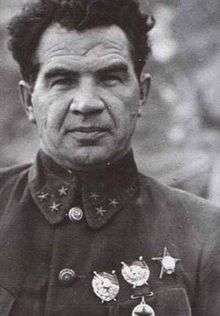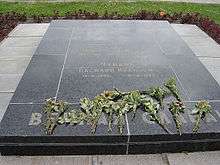Vasily Chuikov
| Vasily Ivanovich Chuikov | |
|---|---|
 Lieutenant General Vasily Ivanovich Chuikov (prior to 1943) | |
| Native name | Василий Иванович Чуйков |
| Nickname(s) |
"The Man of Iron Will" "The Stone" |
| Born |
12 February 1900 Serebryanye Prudy, Tula Governorate, Russian Empire |
| Died |
18 March 1982 (aged 82) Moscow, Soviet Union |
| Place of burial | Mamayev Kurgan, Volgograd, Russia |
| Allegiance |
|
| Years of service | 1917–72 |
| Rank | Marshal of the Soviet Union |
| Commands held |
4th Army 62nd Army 8th Guards Army Group of Soviet Forces in Germany Kiev Military District |
| Battles/wars |
Russian Civil War
Winter War Second Sino-Japanese War |
| Awards | |
| Other work | 1961 until his death, he was a member of the Central Committee of the Communist Party of the Soviet Union |
Vasily Ivanovich Chuikov (Russian: Васи́лий Ива́нович Чуйко́в; 12 February 1900 – 18 March 1982) was a Soviet lieutenant general in the Red Army during World War II, commander of the 62nd Army during the Battle of Stalingrad, twice Hero of the Soviet Union (1944, 1945), and after the war a Marshal of the Soviet Union.
Early life
Born into a peasant family in the village of Serebryanye Prudy in the Tula region south of Moscow, he was the eighth of twelve children and the fifth of eight sons. At the age of twelve, he left school and his family home to earn his living in a factory in St. Petersburg, turning out spurs for cavalry officers. [1] Chuikov and all his brothers became soldiers and fought in the Russian Civil War.[2]
The Russian Revolution and Civil War
During the turmoil of the Russian Revolution of 1917, Chuikov became unemployed. Later the same year, an older brother arranged for Chuikov to be recruited into the Red Guards. The year after, in 1918, he joined the Red Army.[1]
In October 1918, Chuikov saw active service when he was sent to the Southern Front as a deputy company commander to fight against the White Army. In the spring of 1919, he became commander of the 40th Regiment (later renamed the 43rd), part of the 5th Army under Tukhachevsky facing the White Army under Kolchak in Siberia.[3]
Chuikov's record of service during the Civil War was distinguished. In the fighting from 1919 to 1920 he received two awards of the Order of the Red Banner for bravery and heroism. He was wounded four times—one, in Poland in 1920, left a fragment in his left arm that could not be operated on. It led to partial paralysis and caused him to lose temporary use of his arm. Chuikov carried this war wound for the rest of his life, and it eventually led to septicaemia breaking out in 1981, causing a nine-month illness and finally his death.[4]
Inter-war period
He left his regiment in 1921 to continue his studies at the Frunze Military Academy, from which he graduated in 1925.[4]
Early Second World War, Finnish War and China (1939 to 1942)
Chuikov commanded the 4th Army in the Soviet invasion of Poland in 1939. He commanded the 9th Army in the Russo-Finnish War of 1940. His army was defeated by the Finns at Suomussalmi and Raate Road. He was then sent to China as an adviser to Chiang Kai-shek. In May 1942, the USSR recalled him. According to Chuikov's memoirs, his recall was due to Nationalist China claiming that the USSR was providing military aid as part of an attempt to draw the USSR into the Second Sino-Japanese War.
Stalingrad (1942 to 1943)
On returning to Moscow, Chuikov was placed in command of the 64th Army (later 7th Guards), on the west bank of the Don River. The 64th Army took part in the fighting withdrawal to Stalingrad, and shortly before the Battle of Stalingrad itself began, Chuikov was made commanding general of the more important weak 62nd Army, which was to hold Stalingrad itself, with the 64th on its southern flank.
It was at Stalingrad that Chuikov developed the important tactic of “hugging the enemy”, Guerrilla warfare, by which under-armed Soviet soldiers kept the German army so close to them as to minimize the superior firepower enjoyed by the Wehrmacht. Chuikov had witnessed firsthand the blitzkrieg tactics the Nazis had used to sweep across the Russian steppe, so he used the Germans' carpet-bombing of the city to draw panzer units into the rubble and chaos, where their progress was impeded. Here they could be destroyed with Molotov cocktails and Russian artillery operating at close range. This tactic also rendered the German Luftwaffe ineffective, since Stuka dive-bombers could not attack Red Army positions without endangering their own forces.[5][6]
Later Second World War (Poland and Germany 1943 to 1945)
After the victory at Stalingrad, the 62nd Army was redesignated the Soviet 8th Guards Army. Chuikov then commanded the 8th Guards as part of 1st Belorussian Front and led its advance through Poland, finally heading the Soviet offensive which conquered Berlin with the Allied forces wiping out what was left in Southern and Western Germany in April/May 1945.
Chuikov's advance through Poland was characterized by massive advances across difficult terrain (on several occasions, the 8th Guards Army advanced over 40 miles in a single day). On 1 May 1945, Chuikov, who commanded his army operating in central Berlin, was the first Allied officer to learn about Adolf Hitler's suicide, being informed by General Hans Krebs who had come to Chuikov's headquarters under a white flag. He accepted the surrender of Berlin's forces from General Helmuth Weidling.
Chuikov appeared in the documentary film Berlin (1945), directed by Yuli Raizman.
Later life
After the war, Chuikov stayed in Germany, later serving as Commander-in-Chief of the Group of Soviet Forces in Germany from 1949 until 1953, when he was made the Commanding General of the Kiev Military District. While serving at that post, on 11 March 1955 he was promoted to Marshal of the Soviet Union. From 1960 to 1964, he was the Commander-in-Chief of the Soviet Army's Ground Forces. He also served as the Chief of the Civil Defense from 1961 until his retirement in 1972. From 1961 until his death, he was a member of the Central Committee of the Communist Party of the Soviet Union.
He was a major consultant for the design of the Stalingrad battle memorial on Mamayev Kurgan, and was buried there after his death at the age of 82.

Memoirs in translation
- The Beginning of the Road: The Story of the Battle for Stalingrad, London, 1963.[7]
- Chuikov, Vasili; David P. Barrett (translator) (2003). Mission to China: Memoirs of a Soviet Military Adviser to Chiang Kaishek. Eastbridge. ISBN 978-1-891936-10-4.
- Chuikov, Vasili (1978). The end of the Third Reich. Moscow: Progress. ISBN 978-0-8285-0453-9.
In popular culture
- Chuikov was briefly featured in the 2004 German-Austrian movie Downfall (Der Untergang), dealing with the fall of Berlin in 1945. He was portrayed by a Russian actor Aleksandr Slastin.
- In Dana Kramer-Rolls' novel Home Is the Hunter, Star Trek character Pavel Chekov refer to Chuikov as his ancestor (although "Vasily" is spelled as "Vassili").
- Chuikov is a character in Robert Conroy's Red Inferno: 1945. The novel follows his career alongside Marshal of the Soviet Union Georgy Zhukov in a fictional situation where the Soviet Union attacks America and the remaining Allied nations. Towards the end, an American Boeing B-29 Superfortress drops a nuclear bomb near the city of Paderborn, Germany, where he is stationed, killing him, Zhukov, and a large portion of the Soviet military's elite forces.
Honours and awards
- Soviet Union
- Foreign
| Patriotic Order of Merit in gold, twice (East Germany) | |
| Grand Star of the Star of People's Friendship (East Germany) | |
| Order of Sukhbaatar (Mongolian People's Republic) | |
| Medal "For Victory over Japan" (Mongolian People's Republic) | |
| Medal "30 year anniversary of the Victory over Japan" (Mongolian People's Republic) | |
| Medal "30 year anniversary of the Battle of Khalkhin Gol" (Mongolian People's Republic) | |
| Medal "40 year anniversary of the Battle of Khalkhin Gol" (Mongolian People's Republic) | |
| Medal "50 years of the Mongolian People's Republic" (Mongolian People's Republic) | |
| Medal "50 years of the Mongolian People's Army" (Mongolian People's Republic) | |
| Cross of Grunwald, 2nd class (Poland) | |
| Grand Cross of the Virtuti Militari (Poland) | |
| Commander's Cross of the Polonia Restituta, (Poland) | |
| Medal "For Warsaw 1939–1945" (Poland, 1946) | |
| Medal "For Oder, Neisse and the Baltic" (Poland, 1946) | |
| Medal "Sino-Soviet friendship" (China) | |
| Distinguished Service Cross (United States) | |
See also
References
- 1 2 Jones, p.73
- ↑ Jones, p.72
- ↑ Jones, p. 74
- 1 2 Jones, p. 75
- ↑ Craig, William (1973). Enemy at the Gates: the Battle for Stalingrad. New York: Penguin Books, ISBN 0-14-200000-0, pp. 90, 91
- ↑ Beevor, Antony (1998). Stalingrad. New York: Viking, ISBN 0-14-024985-0, pp. 128, 129
- ↑ Keegan, John. The Battle for History: Re-fighting World War Two (Barbara Frum lecture series), Vintage Canada, Toronto, 1995. Republished by Vintage Books, New York, 1996, p. 121
Bibliography
- Jones, Michael K. (2010). Stalingrad: How the Red Army Triumphed. UK: Pen & Sword Books. ISBN 978-1-84884-201-4.
External links
| Wikiquote has quotations related to: Vasily Chuikov |
| Wikimedia Commons has media related to Vasily Chuikov. |
- (Russian) Memoirs by Vasili Chuikov: Сражение века Battle of the Century – Describes his experiences during the Battle of Stalingrad.
- (Russian) Memoirs by Vasili Chuikov: Конец третьего рейха The End of the Third Reich – Describes his experiences during the last months of the war, ending with the Battle of Berlin.
- (Russian) Biography on the website dedicated to the Heroes of the Soviet Union/Russia.
| ||||||
|